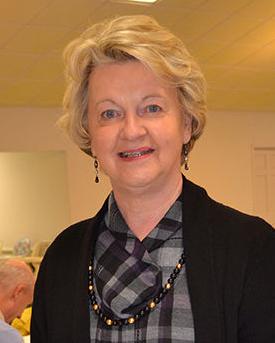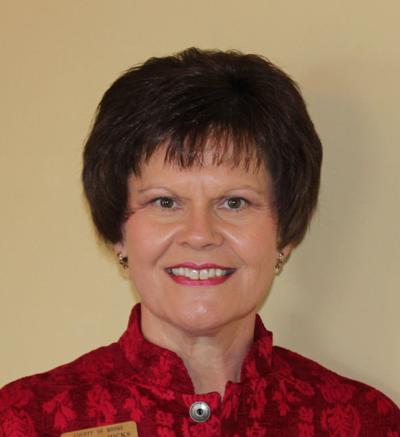
Citizens upset with ongoing coronavirus safety protocols in the schools and Health Department challenged the Moore County Commissioners during the public comment period of Tuesday’s business meeting.
Much of the focus was on the local health board and Board of Education policies and data, with several recommending commissioners withhold funding to these institutions until student mask mandates are lifted.
“We are not satisfied with the job you are doing…I want to stress that we are neither pro-mask or anti-mask, pro-vaccine or anti-vaccine. What we are in favor of is for you, the commissioners, and the Board of Health to do your jobs. And, in particular, for the Board of Health to completely and properly inform the citizens of Moore County about COVID,” said Mike Fridel.
Other speakers, including Tom LoSopio and Beth Ann Pratte, questioned the veracity of data that health officials provide, and they argued that face masks provide inadequate protection and are not necessary.
Now more than a year into students wearing face masks at school, parent Tanya Arnett argued there has been no regard for the long term effects on students from the school mask policy. She asked county leaders to restore parental rights by making face masks optional, a request that was echoed by several other speakers.
The General Assembly has vested individual school boards with that authority and required those boards to evaluate local conditions and make a decision every month over whether to make face masks mandatory or optional. Moore County Schools officials work in concert with the Health Department regularly to review that data. Another decision on whether to continue mandatory face masks is slated for the school board’s November meeting.
Other speakers Tuesday night criticized the school board’s public comment policies, which they say are part of a broader effort to silence those opposed to mask mandates. Recent school board meetings have had public comment periods lasting up to two hours, with many of the speakers critical of the board’s policies.
Several local residents have criticized the school board for continuing to hold its regular board meetings at its central office board room, which can only accommodate a few dozen people, instead of scheduling meetings in larger school gyms and auditoriums that can seat more people.
The board last month moved meetings back to its Carthage meeting room and instituted several safety measures, including metal detectors, after the district said it had received a threat recorded on a phone line. The Pilot filed a public records request for the threat and related content, but it remains under investigation by Moore County Schools Police.
Speaking to commissioners Tuesday night, Cortney Grozs said the county’s pandemic policies should be dictated as a matter of common sense at this point.
“I think you all are capable of understanding the facts and data and doing your own research,” she said. ““You have seen the effects of COVID, seen the effects of vaccinations, seen the effects of masking, seen the effects of mandates, seen the effects on our economy, seen the effects on our society, seen the effects on all of our psyches and the way we socially interact with each other, and the financial impact on our communities and ourselves.”
“It seems like the school board was blaming the health department for mandates, so I’m wondering who is in charge,” said Margaret Smetana. She also questioned whether Moore County Schools spent less of its budget last year on things like utilities, as a result of virtual learning, “so I’m hoping that means (school) appropriations will be less.”
County Vice Chair Louis Gregory, who also serves on the 11-member Moore County Board of Health, said it is the responsibility of the health director to determine appropriate public health policies under the direction of the county’s health board.
Later in the meeting, Gregory also addressed criticism directed at the Board of Education.
“We should never forget that our school board is an elected position,” Gregory said, “and they themselves are the ones that we should listen to, find fault with if there is any, and none of that reflects on this board. We have tried our very best to stay out of their business; it is their business. They are elected officials with our county. If there is any criticism whatsoever, I want to reiterate that those comments should be directed to school board officials, and not us.”
Redistricting Plan Questioned
Earlier this year, county leaders anticipated a Nov. 17 deadline to approve changes to the commissioners’ district boundaries ahead of primary elections next spring.
However, earlier this month, County Attorney Misty Leland discovered information passed down from the State Board of Elections to local officials indicating the deadline for changing districts was actually Oct. 9.
In response, county leaders quickly approved an updated redistricting plan on Oct. 5. A public hearing is not required to make these changes but there was general consensus among commissioners that the accelerated timeline was less than ideal.
Commissioners’ district lines are used for county elections only and do not impact ongoing state redistricting work underway by the General Assembly. Each commissioner must live in the district they represent but are elected by voters countywide.
According to the 2020 census data, Moore County’s estimated population stands at 99,727. Ideally, each of the five districts would represent approximately 19,950 individuals. The districts should also be drawn to maintain the integrity of communities — and voting precincts — within a single district when possible.
As presented and approved by county leaders:
- District I brings Carthage, Cameron, Whispering Pines and Vass within a single, unified district (pop. 23,371).
- District II represents Pinehurst, Seven Lakes, Taylortown and the majority of the Eastwood precinct (pop. 26,681).
- District III encompasses nearly all of the northern end of Moore County and the redrawn lines expanded the territory from 239 square miles to 341 square miles, however it is still the least populated district (pop. 14,027).
- District IV brings all of Southern Pines into a single, unified district (pop. 18,956).
- District V represents the southernmost end of Moore County and encompasses Aberdeen, Pinebluff and reunites Foxfire into a single residency district (pop. 16,692).
Maurice Holland Jr., chairman of the Moore County Democratic Party, said he was disappointed a public hearing had not been scheduled prior to adoption of the redrawn districts. He noted that District II and District IV are oversized, based on the ideal district population count.
In addition, he said, the third and fifth are undersized by comparison.
“In the interest of transparency, a public hearing should be held prior to adoption of any maps. We also request that the Moore County Board of Commissioners adhere to the doctrine of one person, one vote in redistricting for both county commissioner districts and the Moore County Board of Education member districts.”
Holland provided county leaders with two alternative district maps, and said the Moore County Democratic Party supports the belief that citizens would be better-served by elections in which voters in each district exclusively determine their own representative.
In terms of the school board, Holland said the same five residential districts should be followed, with members elected by single member districts and two at-large school board members.
In other action at its Oct. 19 meeting, the Board of Commissioners:
heard a COVID-19 update from the Health Department;
approved the Community Transportation Program grant application;
reappointed Commissioners Chair Frank Quis to the TARPO Rural Transportation Advisory Committee; and
appointed Tim Venjohn as the ETJ member of the Whispering Pines Tree Board.
Citizens upset with ongoing coronavirus safety protocols in the schools and Health Department challenged the Moore County Commissioners during the public comment period of Tuesday’s business meeting.
Much of the focus was on the local health board and Board of Education policies and data, with several recommending commissioners withhold funding to these institutions until student mask mandates are lifted.
“We are not satisfied with the job you are doing…I want to stress that we are neither pro-mask or anti-mask, pro-vaccine or anti-vaccine. What we are in favor of is for you, the commissioners, and the Board of Health to do your jobs. And, in particular, for the Board of Health to completely and properly inform the citizens of Moore County about COVID,” said Mike Fridel.
Other speakers, including Tom LoSopio and Beth Ann Pratte, questioned the veracity of data that health officials provide, and they argued that face masks provide inadequate protection and are not necessary.
Now more than a year into students wearing face masks at school, parent Tanya Arnett argued there has been no regard for the long term effects on students from the school mask policy. She asked county leaders to restore parental rights by making face masks optional, a request that was echoed by several other speakers.
The General Assembly has vested individual school boards with that authority and required those boards to evaluate local conditions and make a decision every month over whether to make face masks mandatory or optional. Moore County Schools officials work in concert with the Health Department regularly to review that data. Another decision on whether to continue mandatory face masks is slated for the school board’s November meeting.
Other speakers Tuesday night criticized the school board’s public comment policies, which they say are part of a broader effort to silence those opposed to mask mandates. Recent school board meetings have had public comment periods lasting up to two hours, with many of the speakers critical of the board’s policies.
Several local residents have criticized the school board for continuing to hold its regular board meetings at its central office board room, which can only accommodate several dozen people, instead of scheduling meetings in larger school gyms and auditoriums.
The board last month moved meetings back to their Carthage office and instituted several safety measures, including metal detectors, after saying they had received a threat
Cortney Grozs said the county’s pandemic policies should be dictated as a matter of common sense at this point.
“I think you all are capable of understanding the facts and data and doing your own research,” she said. ““You have seen the effects of Covid, seen the effects of vaccinations, seen the effects of masking, seen the effects of mandates, seen the effects on our economy, seen the effects on our society, seen the effects on all of our psyches and the way we socially interact with each other, and the financial impact on our communities and ourselves.”
“It seems like the school board was blaming the health department for mandates, so I’m wondering who is in charge,” said Margaret Smetana. She also questioned whether Moore County Schools spent less of its budget last year on things like utilities, as a result of virtual learning, “so I’m hoping that means (school) appropriations will be less.”
County Vice Chair Louis Gregory, who also serves on the 11-member Moore County Board of Health, said it is the responsibility of the health director to determine appropriate public health policies under the direction of the county’s health board.
Later in the meeting, Gregory also addressed criticism directed at the Board of Education.
“We should never forget that our school board is an elected position,” Gregory said, “and they themselves are the ones that we should listen to, find fault with if there is any, and none of that reflects on this board. We have tried our very best to stay out of their business: it is their business. They are elected officials with our county. If there is any criticism whatsoever, I want to retitrate those comments should be directed to school board officials, and not us.”
Redistricting Plan Questioned
Earlier this year, county leaders anticipated a Nov. 17 deadline to approve any changes to the residency district boundaries ahead of primary elections next spring.
However in early October, County Attorney Misty Leland discovered information passed down from the State Board of Elections to local officials was incomplete. The actual deadline for approving any changes to redistricting lines was actually Oct. 9.
In response, county leaders quickly approved an updated redistricting plan on Oct. 5. A public hearing is not required to make these changes but there was general consensus that the accelerated timeline was a less-than-ideal situation.
The five residency districts are used for county elections only, and do not have any impact on the ongoing state redistricting work underway by the General Assembly. Each county commissioner must live in the election district they represent but all qualified voters in the county may vote for all five county commissioner members.
According to the 2020 census data, Moore County’s estimated population stands at 99,727. Ideally, each of the five districts would represent approximately 19,950 individuals. The districts should also be drawn to maintain the integrity of communities — and voting precincts — within a single district when possible.
As presented and approved by county leaders:
- District I brings Carthage, Cameron, Whispering Pines and Vass within a single, unified district (pop. 23,371).
- District II represents Pinehurst, Seven Lakes, Taylortown and the majority of the Eastwood precinct (pop. 26,681).
- District III encompasses nearly all of the northern end of Moore County and the redrawn lines expanded the territory from 239 square miles to 341 square miles, however it is still the least populated district (pop. 14,027).
- District IV brings all of Southern Pines into a single, unified district (pop. 18,956).
- District V represents the southernmost end of Moore County and encompasses Aberdeen, Pinebluff and reunites Foxfire into a single residency district (pop. 16,692).
Maurice Holland Jr., chairman of the Moore County Democratic Party, said he was disappointed a public hearing had not been scheduled prior to adoption of the redrawn districts. He noted that District II and District IV are oversized, based on the ideal district population count. In addition, District III and District V are undersized by comparison.
“In the interest of transparency a public hearing should be held prior to adoption of any maps. We also request that the Moore County Board of Commissioners adhere to the doctrine of one person one vote in redistricting for both county commissioner districts and the Moore County Board of Education member districts.”
Holland provided county leaders with two alternative district maps, for their consideration, and said the Moore County Democratic Party supports the belief that citizens would be better-served by county board elections where voters in each district exclusively determine their own representative. In terms of the school board, Holland said the same five residential districts should be followed, with members elected by single member districts and two at-large school board members.
In other action on Oct. 19, the Moore County Board of Commissioners:
Heard a COVID-19 update from the Health Department
Approved the Community Transportation Program grant application
Reappointed County Chair Frank Quis to the TARPO Rural Transportation Advisory Committee
Appointed Tim Venjohn as the ETJ member of the Whispering Pines Tree Board



